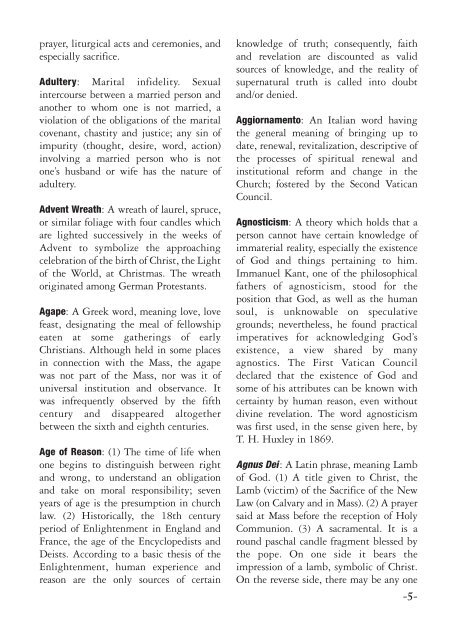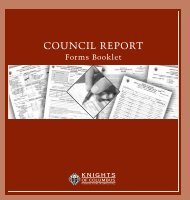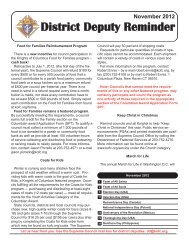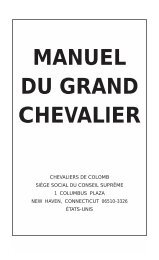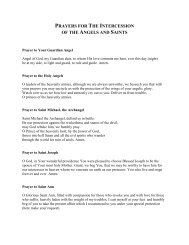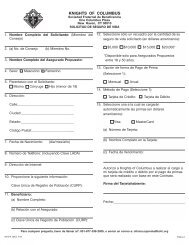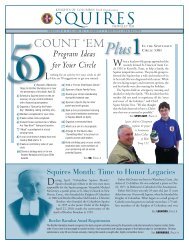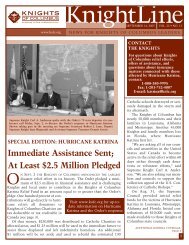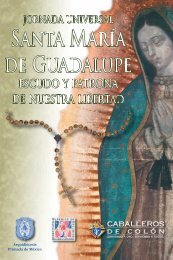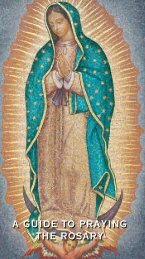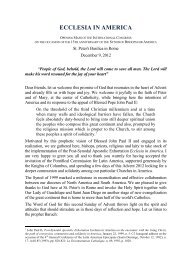CATHOLIC WORD BOOK - Knights of Columbus, Supreme Council
CATHOLIC WORD BOOK - Knights of Columbus, Supreme Council
CATHOLIC WORD BOOK - Knights of Columbus, Supreme Council
You also want an ePaper? Increase the reach of your titles
YUMPU automatically turns print PDFs into web optimized ePapers that Google loves.
prayer, liturgical acts and ceremonies, and<br />
especially sacrifice.<br />
Adultery: Marital infidelity. Sexual<br />
intercourse between a married person and<br />
another to whom one is not married, a<br />
violation <strong>of</strong> the obligations <strong>of</strong> the marital<br />
covenant, chastity and justice; any sin <strong>of</strong><br />
impurity (thought, desire, word, action)<br />
involving a married person who is not<br />
one’s husband or wife has the nature <strong>of</strong><br />
adultery.<br />
Advent Wreath: A wreath <strong>of</strong> laurel, spruce,<br />
or similar foliage with four candles which<br />
are lighted successively in the weeks <strong>of</strong><br />
Advent to symbolize the approaching<br />
celebration <strong>of</strong> the birth <strong>of</strong> Christ, the Light<br />
<strong>of</strong> the World, at Christmas. The wreath<br />
originated among German Protestants.<br />
Agape: A Greek word, meaning love, love<br />
feast, designating the meal <strong>of</strong> fellowship<br />
eaten at some gatherings <strong>of</strong> early<br />
Christians. Although held in some places<br />
in connection with the Mass, the agape<br />
was not part <strong>of</strong> the Mass, nor was it <strong>of</strong><br />
universal institution and observance. It<br />
was infrequently observed by the fifth<br />
century and disappeared altogether<br />
between the sixth and eighth centuries.<br />
Age <strong>of</strong> Reason: (1) The time <strong>of</strong> life when<br />
one begins to distinguish between right<br />
and wrong, to understand an obligation<br />
and take on moral responsibility; seven<br />
years <strong>of</strong> age is the presumption in church<br />
law. (2) Historically, the 18th century<br />
period <strong>of</strong> Enlightenment in England and<br />
France, the age <strong>of</strong> the Encyclopedists and<br />
Deists. According to a basic thesis <strong>of</strong> the<br />
Enlightenment, human experience and<br />
reason are the only sources <strong>of</strong> certain<br />
knowledge <strong>of</strong> truth; consequently, faith<br />
and revelation are discounted as valid<br />
sources <strong>of</strong> knowledge, and the reality <strong>of</strong><br />
supernatural truth is called into doubt<br />
and/or denied.<br />
Aggiornamento: An Italian word having<br />
the general meaning <strong>of</strong> bringing up to<br />
date, renewal, revitalization, descriptive <strong>of</strong><br />
the processes <strong>of</strong> spiritual renewal and<br />
institutional reform and change in the<br />
Church; fostered by the Second Vatican<br />
<strong>Council</strong>.<br />
Agnosticism: A theory which holds that a<br />
person cannot have certain knowledge <strong>of</strong><br />
immaterial reality, especially the existence<br />
<strong>of</strong> God and things pertaining to him.<br />
Immanuel Kant, one <strong>of</strong> the philosophical<br />
fathers <strong>of</strong> agnosticism, stood for the<br />
position that God, as well as the human<br />
soul, is unknowable on speculative<br />
grounds; nevertheless, he found practical<br />
imperatives for acknowledging God’s<br />
existence, a view shared by many<br />
agnostics. The First Vatican <strong>Council</strong><br />
declared that the existence <strong>of</strong> God and<br />
some <strong>of</strong> his attributes can be known with<br />
certainty by human reason, even without<br />
divine revelation. The word agnosticism<br />
was first used, in the sense given here, by<br />
T. H. Huxley in 1869.<br />
Agnus Dei: A Latin phrase, meaning Lamb<br />
<strong>of</strong> God. (1) A title given to Christ, the<br />
Lamb (victim) <strong>of</strong> the Sacrifice <strong>of</strong> the New<br />
Law (on Calvary and in Mass). (2) A prayer<br />
said at Mass before the reception <strong>of</strong> Holy<br />
Communion. (3) A sacramental. It is a<br />
round paschal candle fragment blessed by<br />
the pope. On one side it bears the<br />
impression <strong>of</strong> a lamb, symbolic <strong>of</strong> Christ.<br />
On the reverse side, there may be any one<br />
-5-


